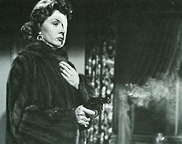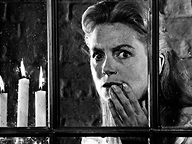Critics are not a unit. There are all sorts of critics. If, on the Web, you go to Senses of Cinema (a wonderful site), you get, as the title suggests, a more or less academic approach, the take from people who have studied film and film theory. Then there are reviewers like Roger Ebert and Leonard Malten, who are much less platonic. I mean, they talk about movies rather than the idea of movies. Then there are the specialists. In the context of Dark Energy, these are commentators like Alain Silver and Eddie Muller - each with an approach quite different from the other - who have zeroed in on Noir and helped make it meaningful to contemporary audiences. If you go on fine tuning, you will discover that each reviewer has his or her own take (compare influential writers Pauline Kael and Andrew Sarris). There is no unanimous agreement on anything. In babble, the often negative tone I adopt toward criticism is specific in its intention; it’s aimed at the notion that there is a universal standard against which movies can be compared. True, there are points of view that dominate film criticism at any given moment, but they get dumped. They may come back; they may not. If they do, in a turn of the clock they’ll be dumped again.
I applaud anyone who opens themselves to all that information, but as to whether or not such a person can legitimately claim to know more about life than, let's say, the average streetwalker who spends her professional existence second-guessing the whims of a wide range of customers, I doubt it. A more old-fashioned, but still very serviceable approach, insists that there are eternal verities, and a commentator wishing to invoke them will call upon tradition and authority of one sort or another. Meanwhile, another commentator calls upon a different interpretation of that same tradition, and insults are exchanged. And, of course, when you've gone on for as long as I have in this essay, any salvo directed at critics or commentators will find you standing in your own line of fire.
|
 We get
peevish when commentators say uncomplimentary things about
movies we revere. It’s like hearing someone bad-mouth
an old friend. But I’ve learned a lot from
We get
peevish when commentators say uncomplimentary things about
movies we revere. It’s like hearing someone bad-mouth
an old friend. But I’ve learned a lot from  Although
it stands to reason most humans have an instinctual feeling their
judgments are rooted in truth, the insistence on nailing it down
comes mostly from evangelicals and certain academics. Regarding the
academic approach, I think the idea is that, as a student in the
postmodern environment, one studies life. You study not just literature
but psychology, history, political science, and so on, so that you
can put the subject of your attention in a wider context. This leads
some critics to say of some directors, "He knows too much about
movies and not enough about life," or words to that effect.
I think maybe they mean that the director in question does not appear
to have taken the academic curriculum that would qualify him or her
to know about life. Keep in mind, most movie critics are not film-school
people. They tend to be lit-school people.
Although
it stands to reason most humans have an instinctual feeling their
judgments are rooted in truth, the insistence on nailing it down
comes mostly from evangelicals and certain academics. Regarding the
academic approach, I think the idea is that, as a student in the
postmodern environment, one studies life. You study not just literature
but psychology, history, political science, and so on, so that you
can put the subject of your attention in a wider context. This leads
some critics to say of some directors, "He knows too much about
movies and not enough about life," or words to that effect.
I think maybe they mean that the director in question does not appear
to have taken the academic curriculum that would qualify him or her
to know about life. Keep in mind, most movie critics are not film-school
people. They tend to be lit-school people. 